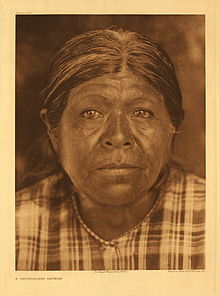Search Results
Featured snippet from the web
People also ask
Web results
begin quote from:
Yokuts are known to have engaged in trading with other California tribes of Native Americans including coastal peoples such as the Chumash of the Central California coast, with whom they are thought to have traded plant and animal products.
Yokuts

Chukchansi Yokuts woman,
photo by Edward Curtis, 1924 | |
| Total population | |
|---|---|
| 6,273 alone and in combination[1] (2010) | |
| Regions with significant populations | |
| Languages | |
| English, Yokuts language[2] | |
| Religion | |
| traditional tribal religion, Christianity, Kuksu religion,[3] previously Ghost Dance[3] | |
| Related ethnic groups | |
| Maidu, Miwok, Ohlone, and Wintu peoples |
The Maidu (previously known as Mariposas[4]) are an ethnic group of Native Americans native to central California. Before European contact, the Yokuts consisted of up to 60 tribes speaking the same language.
Some of their descendants prefer to refer to themselves by their respective tribal names and reject the name Yokuts with the claim that it is an exonyminvented by English speaking settlers and historians.[citation needed] "Maidu" means "People". Conventional sub-groupings include the Foothill Yokuts, Northern Valley Yokuts, and Southern Valley Yokuts.[5]
Contents
Territory[edit]
Yokuts tribes populated the San Joaquin Valley,[2] from the Sacramento-San Joaquin River Delta ("the delta") south to Bakersfield and the adjacent foothills of the Sierra Nevada mountain range, which lies to the east.
In the northern half of the Yokuts region, there were some tribes inhabiting the foothills of the Coast Range, which lies to the west. There is evidence of Yokuts inhabiting the Carrizo Plain and creating rock art in the Painted Rock area.
Population[edit]
Estimates for the pre-contact populations of most native groups in California have varied substantially (See Population of Native California). Alfred L. Kroeberin 1925[6] put the 1770 population of the Yokut at 18,000. Several subsequent investigators suggested that the total should be substantially higher.[7] Robert F. Heizer and Albert B. Elsasser 1980[8] suggested that the Yokut had numbered about 70,000. They had one of the highest regional population densities in pre-contact North America.[2]
The numbers of Foothill Yokut were reduced by around 93% between 1850 and 1900. A few Valley Yokut remain, the most prominent tribe among them being the Tachi. Kroeber estimated the population of the Yokut in 1910 as 600.
Today there are about 2000 enrolled Yokut in the federally recognized tribe and 600 more Yokut belonging to unrecognized tribes.[2]
Language[edit]
Communities[edit]
Yokuts bands[edit]
- Casson
- Choinumni
- Chukchansi (Mono language name: wowa)[9]
- Lakisamni
- Tachi tribe (Tache)
- Wukchumni[2]
- Chowchilla
Contemporary tribes[edit]
- Santa Rosa Rancheria (Tachi)
- Picayune Rancheria of Chukchansi Indians (multiple tribes reside under the Picayune Rancheria)
- Table Mountain Rancheria (Chukchansi)
- Tejon Indian Tribe of California
- Tule River Indian Tribe of the Tule River Reservation[10]
- Tuolumne Rancheria[2]
The contemporary Wukchumni and Choinumni communities do not yet have federal recognition.[10]
Trading routes[edit]
Yokuts are known to have engaged in trading with other California tribes of Native Americans including coastal peoples such as the Chumash of the Central California coast, with whom they are thought to have traded plant and animal products.[11]
Internal conflicts within the Chukchansi tribe near Yosemite[edit]
On 5 April 2015 (4-5-2015), it was reported that members of the Chukchansi tribe near Yosemite have been disenrolling other members from the tribe for decades, so that the tribe's casino profits go to fewer people. In the autumn of 2014, several disenrolled Chukchansi tribe members (who were no longer receiving a share of casino profits) arrived at the Chukchansi Gold Resort & Casino armed with guns, and violence ensued. As a result, a federal judge ordered that the casino be shut down.[12]
Notable Yokuts[edit]
Tribal Government[edit]
-Researched by Mary Ann Brensel[13]






No comments:
Post a Comment